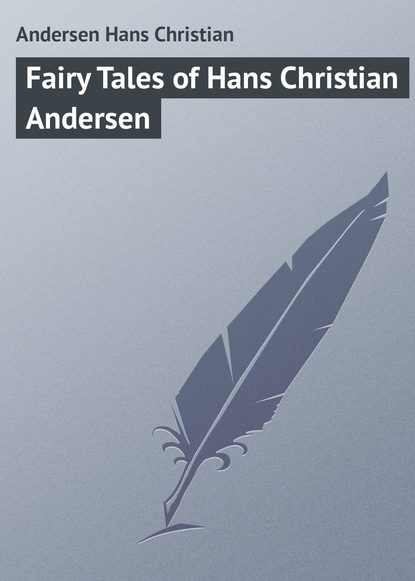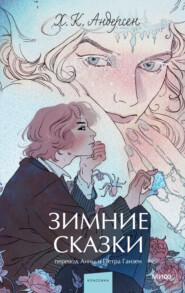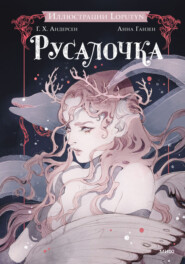По всем вопросам обращайтесь на: info@litportal.ru
(©) 2003-2024.
✖
Fairy Tales of Hans Christian Andersen
Настройки чтения
Размер шрифта
Высота строк
Поля
"There goes the old washerwoman up the lane," said the mother, as she looked out of the window; "the poor woman can hardly drag herself along, and now she had to drag a pail of water from the well. Be a good boy, Tuk, and run across and help the old woman, won't you?"
So Tuk ran across quickly, and helped her, but when he came back into the room it was quite dark, and there was not a word said about a light, so he was obliged to go to bed on his little truckle bedstead, and there he lay and thought of his geography lesson, and of Zealand, and of all the master had told him. He ought really to have read it over again, but he could not for want of light. So he put the geography book under his pillow, for he had heard that this was a great help towards learning a lesson, but not always to be depended upon. He still lay thinking and thinking, when all at once it seemed as if some one kissed him on his eyes and mouth. He slept and yet he did not sleep; and it appeared as if the old washerwoman looked at him with kind eyes and said, "It would be a great pity if you did not know your lesson to-morrow morning; you helped me, and now I will help you, and Providence will always keep those who help themselves;" and at the same time the book under Tuk's pillow began to move about. "Cluck, cluck, cluck," cried a hen as she crept towards him. "I am a hen from Kjoge," and then she told him how many inhabitants the town contained, and about a battle that had been fought there, which really was not worth speaking of.
"Crack, crack," down fell something. It was a wooden bird, the parrot which is used as a target as Prastoe. He said there were as many inhabitants in that town as he had nails in his body. He was very proud, and said, "Thorwalsden lived close to me, and here I am now, quite comfortable."
But now little Tuk was no longer in bed; all in a moment he found himself on horseback. Gallop, gallop, away he went, seated in front of a richly-attired knight, with a waving plume, who held him on the saddle, and so they rode through the wood by the old town of Wordingburg, which was very large and busy. The king's castle was surrounded by lofty towers, and radiant light streamed from all the windows. Within there were songs and dancing; King Waldemar and the young gayly-dressed ladies of the court were dancing together. Morning dawned, and as the sun rose, the whole city and the king's castle sank suddenly down together. One tower after another fell, till at last only one remained standing on the hill where the castle had formerly been.
The town now appeared small and poor, and the school-boys read in their books, which they carried under their arms, that it contained two thousand inhabitants; but this was a mere boast, for it did not contain so many.
And again little Tuk lay in his bed, scarcely knowing whether he was dreaming or not, for some one stood by him.
"Tuk! little Tuk!" said a voice. It was a very little person who spoke. He was dressed as a sailor, and looked small enough to be a middy, but he was not one. "I bring you many greetings from Corsor. It is a rising town, full of life. It has steamships and mail-coaches. In times past they used to call it ugly, but that is no longer true. I lie on the sea-shore," said Corsor; "I have high-roads and pleasure-gardens; I have given birth to a poet who was witty and entertaining, which they are not all. I once wanted to fit out a ship to sail round the world, but I did not accomplish it, though most likely I might have done so. But I am fragrant with perfume, for close to my gates most lovely roses bloom."
Then before the eyes of little Tuk appeared a confusion of colors, red and green; but it cleared off, and he could distinguish a cliff close to the bay, the slopes of which were quite overgrown with verdure, and on its summit stood a fine old church with pointed towers. Springs of water flowed out of the cliff in thick waterspouts, so that there was a continual splashing. Close by sat an old king with a golden crown on his white head. This was King Hroar of the Springs and near the springs stood the town of Roeskilde, as it is called. Then all the kings and queens of Denmark went up the ascent to the old church, hand in hand, with golden crowns on their heads, while the organ played and the fountains sent forth jets of water.
Little Tuk saw and heard it all. "Don't forget the names of these towns," said King Hroar.
All at once everything vanished; but where! It seemed to him like turning over the leaves of a book. And now there stood before him an old peasant woman, who had come from Soroe where the grass grows in the market-place. She had a green linen apron thrown over her head and shoulders, and it was quite wet, as if it had been raining heavily. "Yes, that it has," said she, and then, just as she was going to tell him a great many pretty stories from Holberg's comedies, and about Waldemar and Absalom, she suddenly shrunk up together, and wagged her head as if she were a frog about to spring. "Croak," she cried; "it is always wet, and as quiet as death in Soroe." Then little Tuk saw she was changed into a frog. "Croak," and again she was an old woman. "One must dress according to the weather," said she. "It is wet, and my town is just like a bottle. By the cork we must go in, and by the cork we must come out again. In olden times I had beautiful fish, and now I have fresh, rosy-cheeked boys in the bottom of the bottle, and they learn wisdom, Hebrew and Greek."
"Croak." How it sounded like the cry of the frogs on the moor, or like the creaking of great boots when some one is marching, – always the same tone, so monotonous and wearing, that little Tuk at length fell fast asleep, and then the sound could not annoy him. But even in this sleep came a dream or something like it. His little sister Gustava, with her blue eyes, and fair curly hair, had grown up a beautiful maiden all at once, and without having wings she could fly. And they flew together over Zealand, over green forests and blue lakes.
"Hark, so you hear the cock crow, little Tuk. 'Cock-a-doodle-doo.' The fowls are flying out of Kjoge. You shall have a large farm-yard. You shall never suffer hunger or want. The bird of good omen shall be yours, and you shall become a rich and happy man; your house shall rise up like King Waldemar's towers, and shall be richly adorned with marble statues, like those at Prastoe. Understand me well; your name shall travel with fame round the world like the ship that was to sail from Corsor, and at Roeskilde, – Don't forget the names of the towns, as King Hroar said, – you shall speak well and clearly little Tuk, and when at last you lie in your grave you shall sleep peacefully, as – "
"As if I lay in Soroe," said little Tuk awaking. It was bright daylight, and he could not remember his dream, but that was not necessary, for we are not to know what will happen to us in the future. Then he sprang out of bed quickly, and read over his lesson in the book, and knew it all at once quite correctly. The old washerwoman put her head in at the door, and nodded to him quite kindly, and said, "Many thanks, you good child, for your help yesterday. I hope all your beautiful dreams will come true."
Little Tuk did not at all know what he had dreamt, but One above did.
THE LOVELIEST ROSE IN THE WORLD
There lived once a great queen, in whose garden were found at all seasons the most splendid flowers, and from every land in the world. She specially loved roses, and therefore she possessed the most beautiful varieties of this flower, from the wild hedge-rose, with its apple-scented leaves, to the splendid Provence rose. They grew near the shelter of the walls, wound themselves round columns and window-frames, crept along passages and over the ceilings of the halls. They were of every fragrance and color.
But care and sorrow dwelt within these halls; the queen lay upon a sick bed, and the doctors declared that she must die. "There is still one thing that could save her," said one of the wisest among them. "Bring her the loveliest rose in the world; one which exhibits the purest and brightest love, and if it is brought to her before her eyes close, she will not die."
Then from all parts came those who brought roses that bloomed in every garden, but they were not the right sort. The flower must be one from the garden of love; but which of the roses there showed forth the highest and purest love? The poets sang of this rose, the loveliest in the world, and each named one which he considered worthy of that title; and intelligence of what was required was sent far and wide to every heart that beat with love; to every class, age, and condition.
"No one has yet named the flower," said the wise man. "No one has pointed out the spot where it blooms in all its splendor. It is not a rose from the coffin of Romeo and Juliet, or from the grave of Walburg, though these roses will live in everlasting song. It is not one of the roses which sprouted forth from the blood-stained fame of Winkelreid. The blood which flows from the breast of a hero who dies for his country is sacred, and his memory is sweet, and no rose can be redder than the blood which flows from his veins. Neither is it the magic flower of Science, to obtain which wondrous flower a man devotes many an hour of his fresh young life in sleepless nights, in a lonely chamber."
"I know where it blooms," said a happy mother, who came with her lovely child to the bedside of the queen. "I know where the loveliest rose in the world is. It is seen on the blooming cheeks of my sweet child, when it expresses the pure and holy love of infancy; when refreshed by sleep it opens its eyes, and smiles upon me with childlike affection."
"This is a lovely rose," said the wise man; "but there is one still more lovely."
"Yes, one far more lovely," said one of the women. "I have seen it, and a loftier and purer rose does not bloom. But it was white, like the leaves of a blush-rose. I saw it on the cheeks of the queen. She had taken off her golden crown, and through the long, dreary night, she carried her sick child in her arms. She wept over it, kissed it, and prayed for it as only a mother can pray in that hour of her anguish."
"Holy and wonderful in its might is the white rose of grief, but it is not the one we seek."
"No; the loveliest rose in the world I saw at the Lord's table," said the good old bishop. "I saw it shine as if an angel's face had appeared. A young maiden knelt at the altar, and renewed the vows made at her baptism; and there were white roses and red roses on the blushing cheeks of that young girl. She looked up to heaven with all the purity and love of her young spirit, in all the expression of the highest and purest love."
"May she be blessed!" said the wise man: "but no one has yet named the loveliest rose in the world."
Then there came into the room a child – the queen's little son. Tears stood in his eyes, and glistened on his cheeks; he carried a great book and the binding was of velvet, with silver clasps. "Mother," cried the little boy; "only hear what I have read." And the child seated himself by the bedside, and read from the book of Him who suffered death on the cross to save all men, even who are yet unborn. He read, "Greater love hath no man than this," and as he read a roseate hue spread over the cheeks of the queen, and her eyes became so enlightened and clear, that she saw from the leaves of the book a lovely rose spring forth, a type of Him who shed His blood on the cross.
"I see it," she said. "He who beholds this, the loveliest rose on earth, shall never die."
THE MAIL-COACH PASSENGERS
It was bitterly cold, the sky glittered with stars, and not a breeze stirred. "Bump" – an old pot was thrown at a neighbor's door; and "bang, bang," went the guns; for they were greeting the New Year. It was New Year's Eve, and the church clock was striking twelve. "Tan-ta-ra-ra, tan-ta-ra-ra," sounded the horn, and the mail-coach came lumbering up. The clumsy vehicle stopped at the gate of the town; all the places had been taken, for there were twelve passengers in the coach.
"Hurrah! hurrah!" cried the people in the town; for in every house the New Year was being welcomed; and as the clock struck, they stood up, the full glasses in their hands, to drink success to the new comer. "A happy New Year," was the cry; "a pretty wife, plenty of money, and no sorrow or care."
The wish passed round, and the glasses clashed together till they rang again; while before the town-gate the mail coach stopped with the twelve strange passengers. And who were these strangers? Each of them had his passport and his luggage with him; they even brought presents for me, and for you, and for all the people in the town. "Who were they? what did they want? and what did they bring with them?"
"Good-morning," they cried to the sentry at the town-gate.
"Good-morning," replied the sentry; for the clock had struck twelve. "Your name and profession?" asked the sentry of the one who alighted first from the carriage.
"See for yourself in the passport," he replied. "I am myself;" and a famous fellow he looked, arrayed in bear-skin and fur boots. "I am the man on whom many persons fix their hopes. Come to me to-morrow, and I'll give you a New Year's present. I throw shillings and pence among the people; I give balls, no less than thirty-one; indeed, that is the highest number I can spare for balls. My ships are often frozen in, but in my offices it is warm and comfortable. My name is JANUARY. I'm a merchant, and I generally bring my accounts with me."
Then the second alighted. He seemed a merry fellow. He was a director of a theatre, a manager of masked balls, and a leader of all the amusements we can imagine. His luggage consisted of a great cask.
"We'll dance the bung out of the cask at carnival time," said he; "I'll prepare a merry tune for you and for myself too. Unfortunately I have not long to live – the shortest time, in fact, of my whole family – only twenty-eight days. Sometimes they pop me in a day extra; but I trouble myself very little about that. Hurrah!"
"You must not shout so," said the sentry.
"Certainly I may shout," retorted the man; "I'm Prince Carnival, travelling under the name of FEBRUARY."
The third now got out. He looked a personification of fasting; but he carried his nose very high, for he was related to the "forty (k)nights," and was a weather prophet. But that is not a very lucrative office, and therefore he praised fasting. In his button-hole he carried a little bunch of violets, but they were very small.
"MARCH, March," the fourth called after him, slapping him on the shoulder, "don't you smell something? Make haste into the guard room; they're drinking punch there; that's your favorite drink. I can smell it out here already. Forward, Master March." But it was not true; the speaker only wanted to remind him of his name, and to make an APRIL fool of him; for with that fun the fourth generally began his career. He looked very jovial, did little work, and had the more holidays. "If the world were only a little more settled," said he: "but sometimes I'm obliged to be in a good humor, and sometimes a bad one, according to circumstances; now rain, now sunshine. I'm kind of a house agent, also a manager of funerals. I can laugh or cry, according to circumstances. I have my summer wardrobe in this box here, but it would be very foolish to put it on now. Here I am. On Sundays I go out walking in shoes and white silk stockings, and a muff."
After him, a lady stepped out of the coach. She called herself Miss MAY. She wore a summer dress and overshoes; her dress was a light green, and she wore anemones in her hair. She was so scented with wild-thyme, that it made the sentry sneeze.
"Your health, and God bless you," was her salutation to him.
How pretty she was! and such a singer! not a theatre singer, nor a ballad singer; no, but a singer of the woods; for she wandered through the gay green forest, and had a concert there for her own amusement.
"Now comes the young lady," said those in the carriage; and out stepped a young dame, delicate, proud, and pretty. It was Mistress JUNE, in whose service people become lazy and fond of sleeping for hours. She gives a feast on the longest day of the year, that there may be time for her guests to partake of the numerous dishes at her table. Indeed, she keeps her own carriage; but still she travelled by the mail, with the rest, because she wished to show that she was not high-minded. But she was not without a protector; her younger brother, JULY, was with her. He was a plump young fellow, clad in summer garments and wearing a straw hat. He had but very little luggage with him, because it was so cumbersome in the great heat; he had, however, swimming-trousers with him, which are nothing to carry. Then came the mother herself, in crinoline, Madame AUGUST, a wholesale dealer in fruit, proprietress of a large number of fish ponds and a land cultivator. She was fat and heated, yet she could use her hands well, and would herself carry out beer to the laborers in the field. "In the sweat of the face shalt thou eat bread," said she; "it is written in the Bible." After work, came the recreations, dancing and playing in the greenwood, and the "harvest homes." She was a thorough housewife.
After her a man came out of the coach, who is a painter; he is the great master of colors, and is named SEPTEMBER. The forest, on his arrival, had to change its colors when he wished it; and how beautiful are the colors he chooses! The woods glow with hues of red and gold and brown. This great master painter could whistle like a blackbird. He was quick in his work, and soon entwined the tendrils of the hop plant around his beer jug. This was an ornament to the jug, and he has a great love for ornament. There he stood with his color pot in his hand, and that was the whole of his luggage. A land-owner followed, who in the month for sowing seed attended to the ploughing and was fond of field sports. Squire OCTOBER brought his dog and his gun with him, and had nuts in his game bag. "Crack, crack." He had a great deal of luggage, even an English plough. He spoke of farming, but what he said could scarcely be heard for the coughing and gasping of his neighbor. It was NOVEMBER, who coughed violently as he got out. He had a cold, which caused him to use his pocket-handkerchief continually; and yet he said he was obliged to accompany servant girls to their new places, and initiate them into their winter service. He said he thought his cold would never leave him when he went out woodcutting, for he was a master sawyer, and had to supply wood to the whole parish. He spent his evenings preparing wooden soles for skates, for he knew, he said, that in a few weeks these shoes would be wanted for the amusement of skating. At length the last passenger made her appearance, – old Mother DECEMBER, with her fire-stool. The dame was very old, but her eyes glistened like two stars. She carried on her arm a flower-pot, in which a little fir-tree was growing. "This tree I shall guard and cherish," she said, "that it may grow large by Christmas Eve, and reach from the ground to the ceiling, to be covered and adorned with flaming candles, golden apples, and little figures. The fire-stool will be as warm as a stove, and I shall then bring a story book out of my pocket, and read aloud till all the children in the room are quite quiet. Then the little figures on the tree will become lively, and the little waxen angel at the top spread out his wings of gold-leaf, and fly down from his green perch. He will kiss every one in the room, great and small; yes, even the poor children who stand in the passage, or out in the street singing a carol about the 'Star of Bethlehem.'"
"Well, now the coach may drive away," said the sentry; "we have the whole twelve. Let the horses be put up."
"First, let all the twelve come to me," said the captain on duty, "one after another. The passports I will keep here. Each of them is available for one month; when that has passed, I shall write the behavior of each on his passport. Mr. JANUARY, have the goodness to come here." And Mr. January stepped forward.
When a year has passed, I think I shall be able to tell you what the twelve passengers have brought to you, to me, and to all of us. Now I do not know, and probably even they don't know themselves, for we live in strange times.
THE MARSH KING'S DAUGHTER
The storks relate to their little ones a great many stories, and they are all about moors and reed banks, and suited to their age and capacity. The youngest of them are quite satisfied with "kribble, krabble," or such nonsense, and think it very grand; but the elder ones want something with a deeper meaning, or at least something about their own family.

















